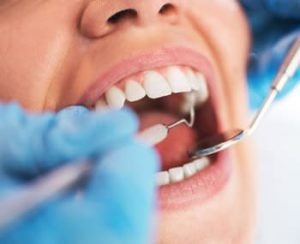Wisdom Teeth
Wisdom teeth, also called third molars, tend to grow in sometime during the teen years or the early twenties. While there are some cases in which the molars at the very back of the mouth erupt with no problem, there is also often insufficient space for these teeth. It is important to have wisdom teeth evaluated for proper growth pattern. Even if teeth do grow in fully, there may be the need for extraction due to the high instance of decay and infection.
When a tooth cannot fit in its given space, it tends to grow at an angle or even downward beneath the gum line. We refer to this as impaction, a condition that can lead to pain, infection, and damage to surrounding tissues. If the tooth only partially emerges, an operculum (flap of skin) may form over it. A partially erupted tooth and flap of skin may invite bacteria, food, and plaque to collect, leading to a temporary but painful infection. This situation also often leads to cavities and periodontal disease.
The Extraction Procedure

If an examination reveals that a tooth is impacted or likely to cause oral problems, we will recommend removal. Depending on the situation, anywhere from one to all four wisdom teeth may be extracted in a single procedure. We perform extractions with local anesthetic and with sedation, which facilitates a peaceful, comfortable procedure.
Extraction of erupted wisdom teeth is very similar to a simple extraction. When teeth are impacted, or trapped beneath the gums, we access them through a small incision in the gums. If necessary, the incision will be closed with sutures after the extraction is complete. We prefer to use a self-dissolving material for this, so there is no need to return to have the stitches removed.
Aftercare
You will need to avoid hard or chewy foods for a few days while your mouth heals. We recommend:
- Thin soup
- Ice cream
- Mashed potatoes
- Yogurt, pudding, and gelatin
- Other foods that do not require chewing
Do not smoke or use a straw when drinking, as the suction can inhibit the necessary clotting process.
Tooth Replacement
Wisdom teeth are not needed for chewing or oral health, and you probably don’t even have room for them in your mouth. They are essentially “extra” teeth and do not need replacing. However, if any other tooth requires extraction, we strongly recommend replacing it with a dental implant and porcelain crown. This will preserve your oral health, jawbone, chewing efficiency and appearance.
To learn more or to schedule an appointment, call Center for Implant Dentistry at (510) 570-1065.